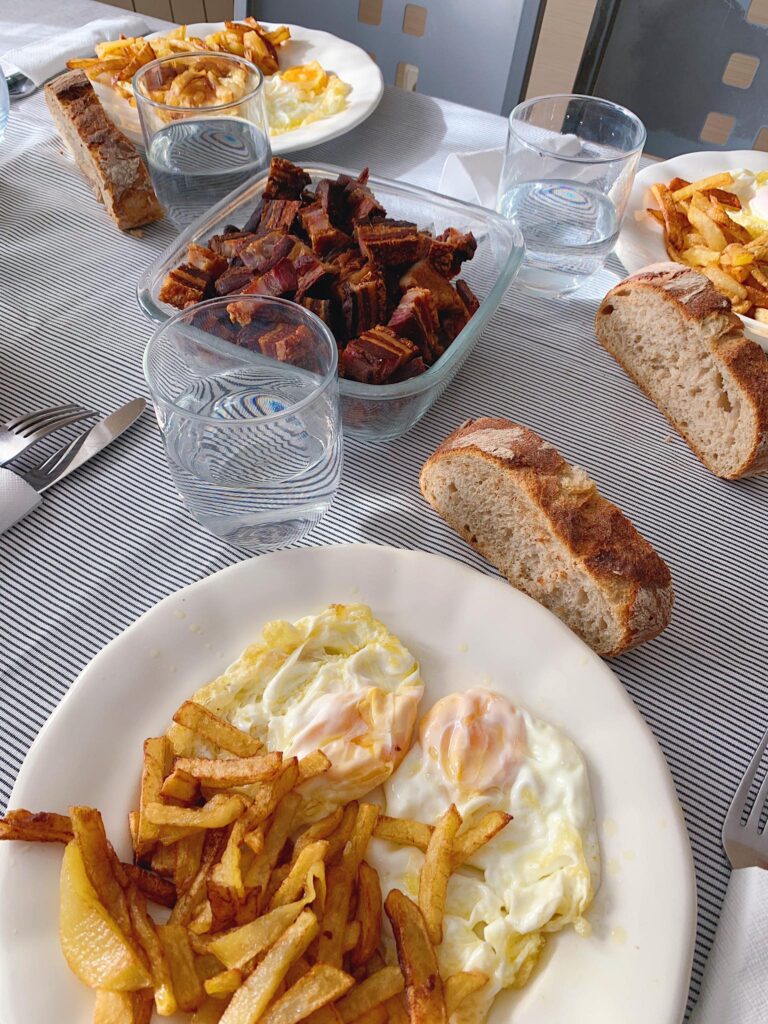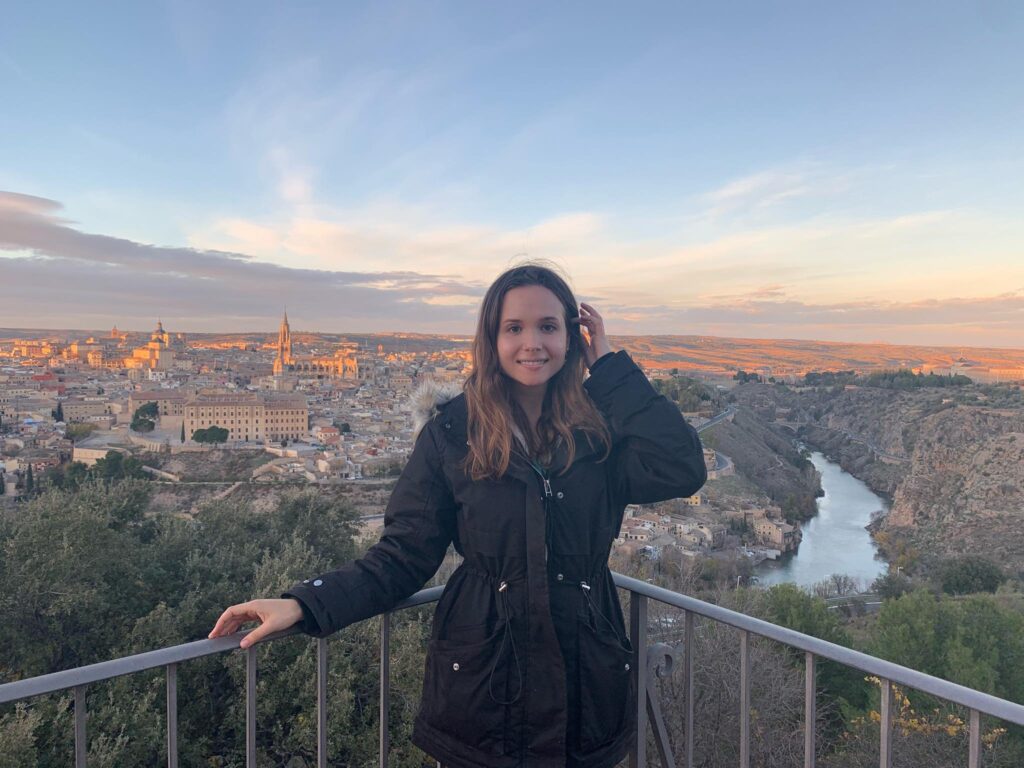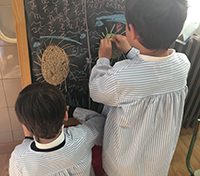I just graduated from college. So, for the past four years, I’ve been accustomed to living independently. I’ve had quite a variety of living situations, from having just one roommate to six others. But I’ve never been living with a host family until I got to Spain.
Why I Chose to Live with a Host Family
I decided to do this for a few reasons. First, I knew it would greatly facilitate my Spanish learning. I’ve been taking Spanish classes for about 10 years, and I’m embarrassingly not fluent yet. While I’m confident with my reading and writing skills, speaking has always been harder for me. And I knew having this immersion would improve my oral Spanish and speaking confidence.
I also figured that, since I’ve never lived abroad before, living with a family would ease the transition for me. And it definitely has. I don’t have to worry about paying rent in a foreign country, buying groceries, cooking, or potentially clashing with my roommates.
In the beginning, I was a bit nervous. But my host parents started emailing me a few months before my arrival. They expressed how excited they were to see me, which got me excited too.
I also actually have two host families. I lived with the first one for four months, which is about halfway through the program. And I have just moved to my new family’s place. The first family has three kids: a 13-year-old girl, a 14-year-old boy, and a 19-year-old girl who was in university but visited occasionally. The second has three as well: an 8-year-old girl, and 11- and 12-year-old boys. This has given me quite an eclectic experience, especially since I’m used to being the younger sibling.
Things I Have Learned about Living with a Host Family
So, without further ado, here are seven things I’ve noticed about living with a host family, many of which I think are universal experiences.
1. Find a Balance and Establish Your Role
When you start living with a host family, you’re there for several things. First, you should help the family with English, you become a “member” of the family, and you’re also an adult. So, it’s important to find a balance between these dimensions and establish your role.
Meddeas has a guide for host families to follow, and one for us as well. It consists of some basic policies and what to expect. For example, keeping your room clean or respecting your family’s values. However, there are some more specific parts, such as a curfew or dedicating certain Saturdays to be “English-only,” that families may amend. At least, in my experience.
For instance, my first host parents knew pretty limited English and did not implement English-only days. But they had me help kids with English homework and play English games with them almost daily.
My new host family has young children, so the schedule is a bit more regimented. My host dad recently wrote up a daily plan with me for helping the kids with English (it totals to about 7.5 hours a week). I get that a schedule is helpful, and the amount of time isn’t too much for me. I still get plenty of free time.
Furthermore, I’m not sure if my experience is a common one. But again, it really depends on the family. It’s important to talk to your host parents, sooner rather than later, about what’s expected of you. And if you feel that it’s too much, don’t be afraid to reach out to Meddeas or your tutor.
2. Parents and Kids Have Varying Levels of English
As I said, I’m fortunate to have a good level of Spanish here, so communication hasn’t been too much of a problem. But it’s fairly common for host parents to know very little English. So, it’s a good idea to at least learn basic conversational skills in Spanish before arriving.
In my first family, the parents only knew a few words of English, while the kids (in fact, adolescents) were very proficient. But in my current family, it’s basically the opposite. My host dad spent a few months living in England, so his English is pretty good.
Either way, they’ll be enthusiastic to learn from a native speaker. That could be through your pharmacist host mom, asking how to say English phrases to her customers. Or your 12-year-old brother hearing the f-word at school and asking you for a direct translation.
3. You will Be Eating so… Well! Prepare Yourself!
Oof, where do I begin? Bread. Let’s start there. Bread and olive oil are a staple of any lunch (comida) in Spain, and frequently dinner too. But despite how good it is (it sounds basic, but seriously, that dark, extra-virgin olive oil hits different), don’t fill up on it because you’ll likely be eating something even more filling for the main course.
My favorite Spanish dishes I’ve eaten so far are tortilla (omelet with potato and sometimes onion), cocido (typical soup with chorizo, beans, veggies), paella, and torreznos. Okay, torreznos isn’t a dish, but it might as well be. It’s basically extra thick, greasy bacon.
All this yummy carb-loaded food is eaten at lunch (around 3 pm), so you’ll have plenty of time to digest before dinner at around 9-10 pm. Despite having finished undergrad, I was still stuck in the classic schedule of waking up at 11, lunch at 12, and dinner at 6 (usually frozen food). So yes, it’s a big change to get used to, but a great one.

4. Your Family Will Want to Introduce You to Spanish Culture, the City You Live in (and Probably Other Places). Take Advantage of That!
Obligatory things are different now because of COVID. But living with a host family is a great way to get exposed to your city and Spain in general.
One of my first few weeks here, my family took me to El Real San Vicente, which is a tiny town in the mountains near my city, Talavera de la Reina. By tiny, I mean its population is 1000. But it’s absolutely beautiful and peaceful.
We also visited Toledo, which is about an hour away. It’s a gorgeous old city with lots of hills, so be prepared for your legs to be sore. I’ve also met a few family members, COVID-safely of course, which has given me more Spanish practice.

5. Kids Are Great
Doing activities with my younger host siblings is always fun. After getting to know them initially, I found our common interests. For instance, the oldest brother loves cooking and baking, so we did that a lot. I introduced the family to snickerdoodles, and they couldn’t get over that word. Even though I don’t live with that family anymore, we still keep in touch through WhatsApp.
My current family is very musically inclined, like me. So, I’ve gotten to sing with the youngest girl and introduced some bands to the older brother. He loves rock but had never heard of Pink Floyd, so I had to fix that. Board games and English word games are also super fun and have been a hit with the kids.

6. Your Host Family Gives You Connections
Moving to a new country alone can be daunting. Especially, if you don’t know anyone. But having a host family definitely made me feel better during the initial transition period. My first weekend, the oldest daughter was visiting from university and took me to get outdoor drinks with two of her friends.
And finally, a great thing about a host family is you’ll always have someone to visit or stay with if (and when) you come back to visit. I was already considering visiting later. But, after having about fifty conversations with Spanish people along the lines of “What a pity you came here during a pandemic… you need to see real Spanish culture!”, I was convinced to return soon, so I can see other cities. And in true Spanish fashion, my host families have insisted that I stay with them when I come back.
These are just some things I have learned so far about living with a host family in Spain. Are you considering choosing a host family as your preferred accommodation option? I encourage you to do it. It is a truly unique experience!










